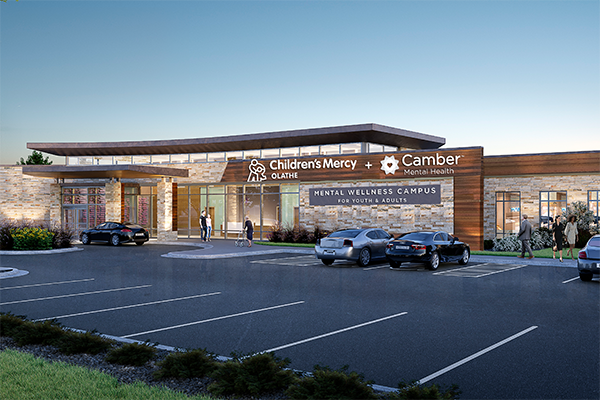- Locations
- How We Help
Overview
As the regional leader in youth mental health treatment, our innovative services help youth achieve health and wellness.
Treatment Programs
- Admissions
Overview
Learn how to admit your child to a Camber treatment location or make a client referral.
- Youth Disorders
- Resources
Overview
Our free resources help you stay informed and educated about mental health, brain development, and childhood trauma as well as how Camber is working toward building healthier communities.
- About Us
Overview
Our philosophy is to provide collaborative, compassionate and effective care through the use of timely, individualized treatment planning.
Learn More About Us
Substance-Use Disorder
 Substance use disorder is a mental illness that causes someone to become addicted to alcohol, tobacco, illegal drugs and/or prescription medication. It affects a person’s brain and behavior and causes them to lose control of their use of one or more substances. Even when the substance misuse leads to harmful or negative consequences, the person can’t control their cravings or urges, and it impacts their ability to function in day-to-day life.
Substance use disorder is a mental illness that causes someone to become addicted to alcohol, tobacco, illegal drugs and/or prescription medication. It affects a person’s brain and behavior and causes them to lose control of their use of one or more substances. Even when the substance misuse leads to harmful or negative consequences, the person can’t control their cravings or urges, and it impacts their ability to function in day-to-day life.
There are many factors that can lead someone to struggle with substance use disorder, including genetics; the way they feel when they use the drug; peer pressure; anxiety, depression, or other emotional distress; and environmental stress. Many of the people who develop substance use disorder also have depression, attention deficit disorder (ADD), post-traumatic stress disorder (PTSD), or another mental illness.
Signs and Symptoms
It can be difficult for a child to understand and explain what they are feeling so it’s very important for caregivers to pay close attention to behaviors. Below is a list of behaviors that may indicate a child or teen is struggling with substance use.
- Dilated pupils, red eyes
- Excessive weight gain or weight loss
- Changes in eating and/or sleeping habits
- Poor personal hygiene
- Missing school, not completing homework, poor school performance, or a sudden drop in grades
- Lying about where they have been or what they have been doing, being very secretive
- Withdrawn from family and friends
- No longer engaging in activities they once enjoyed
- Irritable
- Argumentative
- Easily confused or forgetful
- Talking about feelings of hopelessness or worthlessness
- Low self-esteem
What You Can Do to Help
If you know a child who is struggling with substance use, here are some things you can do to help them:
- Seek professional help. It’s important to have a physician or licensed mental health professional examine the child for an accurate assessment and diagnosis of their physical and mental health.
- If the youth expresses thoughts of suicide, call 911 immediately. Take these statements very seriously and get them professional help as soon as possible.
- Speak to their teachers and school counselors to ensure they know that the child may need additional supervision and support at school.
- Find a local support group for children and families with substance use disorders.
- Encourage frequent, open and honest conversations without judgment, shaming or blaming. Help the child feel comfortable sharing about their feelings and struggles so that you can help them get the support they need.
Camber Children’s Mental Health Can Help
Camber is a network of nonprofit children’s mental health hospitals and residential treatment centers serving youth ages 6 to 18. Each year, we give thousands of youth a safe place to heal, build resilience, and overcome struggles with mental health conditions. Our compassionate team of psychiatric, medical and behavioral health professionals provides a nurturing and therapeutic experience along with a treatment plan tailored to meet each child’s individual needs. The goal of our treatment programs is for each child to safely return home with the resources and supports in place to live a healthy and happy life in their community.
If you’re concerned that a child in your care is struggling with substance use or other mental health needs, call Camber at 913-890-7468. We’re available 24/7 to answer your questions.
Here are some Camber resources to help you understand and address Substance-Use Disorder:
- Take this quick assessment to determine if your child might need professional mental health treatment
- Use these easy deep breathing techniques when feeling overwhelmed [VIDEO]
- Make an emotion regulation plan to identify triggers and helpful coping skills for when emotions become overwhelming
- Understand common mental health warning signs to watch out for
- Get your body moving! Follow along with these simple exercises you can do at home [VIDEO]
- Understand how the brain develops and how stress can affect healthy growth
- Nourish your mind and body with this easy homemade granola recipe [VIDEO]
Here’s a list of additional resources you can contact for help:
- Call the child’s primary care physician or your local community mental health center
- Call the Substance Abuse and Mental Health Services Administration (SAMHSA) Helpline at 1-800-662-4357
- Visit the Anxiety & Depression Association of America website at adaa.org
- Text HOME to 741741 for 24/7 support from the Crisis Text Line
- Call the National Alliance on Mental Illness helpline at 800-950-6264 or visit their website at nami.org
- Learn more and access resources from the Child Mind Institute
Share this information with your support system! View and download this information as a PDF.




